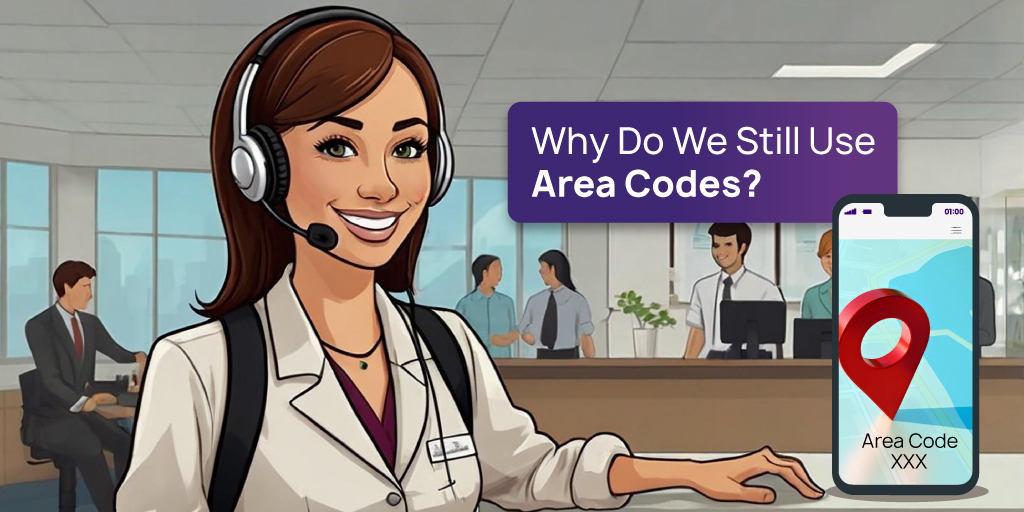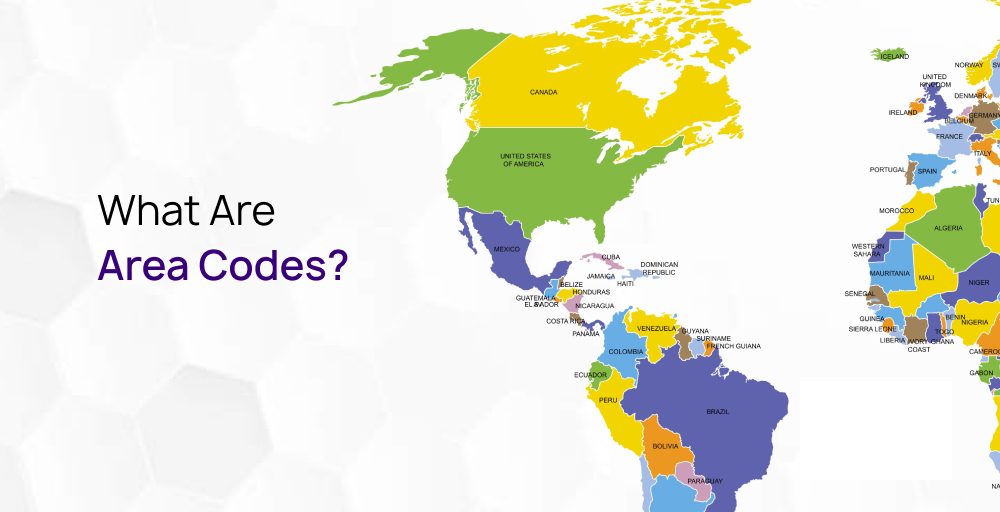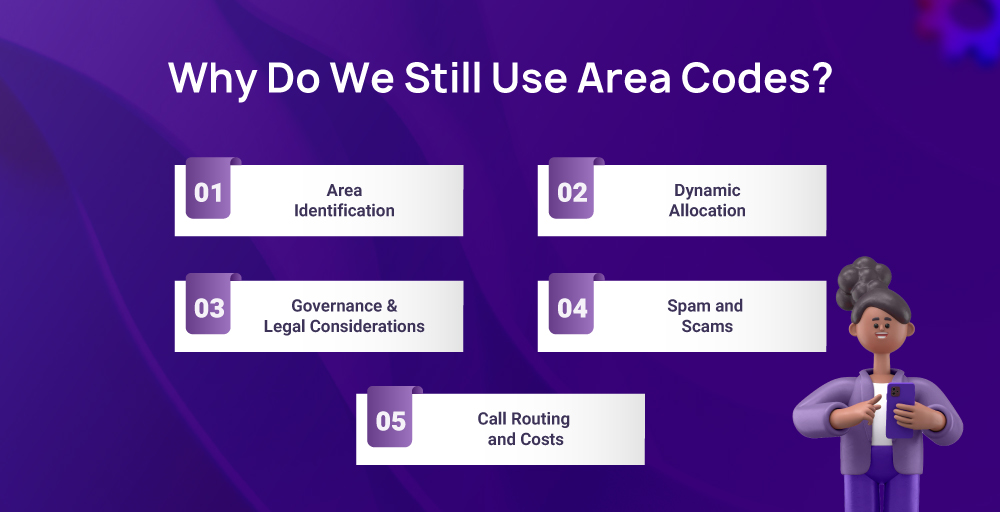Why Do We Still Use Area Codes?

Why Do We Still Use Area Codes?
Imagine calling a number without those familiar three-digit codes at the beginning. Seems strange, right?
Despite instant communication and advanced technology, area codes still play a crucial role in our daily communication. Area codes help determine where the call is coming from. However, several apps can help you find out the exact location of the call. So, why do we still use area codes for this purpose?
The story behind area codes is more than just a technical necessity—it’s a tale of history, identity, and evolving communication. Read the blog below to get more insight into area codes, their purpose, why we are still using them, and their impact on businesses and consumers.
🔑 KEY HIGHLIGHTS:
- Area codes are still used for area identification, dynamic allocation, governance and legal considerations, spam and scams, call routing, and cost.
- Area codes are the three prefix numbers used before the 10-digit phone number.
- The primary purpose of area codes is to identify the exact location of the calling or caller party.
- Area codes have a huge impact on both businesses and consumers.
What are Area codes?

Area codes are commonly three-digit numbers that are used at the beginning of telephone numbers to represent a certain area within a country. They are not just a status symbol but a key component of a numbering plan, a system that allocates telephone numbers within a region or country.
Most countries around the world use the numbering plan system to structure area codes while maintaining consistency and avoiding overlapping. For example, in the North American Numbering Plan (NANP), area codes are standardized to be three digits long. In countries like Germany and the United Kingdom, the area code ranges from two to five digits.
Purpose of Area Codes
Area Codes are an essential part of our daily life phone communication. Let’s look at what purpose it serves:
1. Historical Context
Area codes were created to solve the rapidly growing demand for telephone services during the mid-20th century. Before the invention of area codes, phone numbers were short and used for local calling. As the population increased, more people began using telephones in urban areas, and the existing numbering systems could not handle every telephone user.
In 1947, AT&T and Bell Labs published an article on a numbering plan. The plan’s main purpose was to create a standardized system to handle long-distance dialing and the increasing need for more phone numbers. As three-digit area codes were assigned to the different regions of the U.S. and Canada, call routing and number management were easier.
2. Geographical Identification
The main purpose of area codes is to identify the geographical area where a certain call has been made. This code system is beneficial to large countries with multiple time zones and numerous regional divisions. With area codes, it is easier to differentiate the telephone numbers of each city or country and remember them in your mind.
Let’s consider an example to understand it better: Suppose on a certain day, your mobile rings with +1 480-555-7689 flashing on your screen. The three-digit number after +1 represents the area code, and the last seven digits are the phone number. Here, 480 area code is an Arizona area code assigned according to the North American Numbering Plan (NANP). This way it helps to determine where the call is coming from.
3. Routing and Call Management
Another purpose of area codes is call routing and management. As technology advanced, people began traveling and settling far away, and then telephones became the means of communication.
The area code helps the telephone company easily route calls to the exact location, allowing you to communicate with your long-distance relatives without any problems. It also reduces network traffic, optimizing the overall telephone network and maintaining call quality.
Why Do We Still Use Area Codes?

Area Codes are still in use for various reasons. The reasons why we still use area codes are:
1. Area Identification
One reason we still use area codes is to identify certain geographical areas within a country. There are different regions in a country, and providing each place with a unique code will help to separate them easily.
The telephone network will not have any confusion about which place to direct the call. Your calls will be directed to the desired location without any delay. This is useful for both personal and business purposes.
2. Dynamic Allocation
The world’s population is increasing rapidly. The more people there are, the more telephone numbers will be required. New area codes help meet this demand by allowing for the smooth allocation of additional numbers.
Moreover, this system doesn’t disrupt the existing setup, making it simple to introduce new area codes. It ensures that as more people need phone numbers, they can easily get one and continue making calls without any issues—another reason why do we still use area codes.
3. Governance and Legal Considerations
Area codes have been used for almost seven decades. If a new system is developed, replacing the decade-old system will require huge infrastructural changes and a large amount of manpower.
Not only software but also the whole hardware will need to be changed, along with legal considerations. Such a change would require uprooting the entire country, which is simply not feasible. Hence, area code systems are still in use rather than a totally new system.
4. Spam and Scams
Spam and scams are becoming frequent with the majority of people using the Internet. People are running after money and want to earn it easily rather than working hard for it. Scammers use the area code of some unknown region to trick the receiver into receiving the call and fool them into believing their lies.
If you frequently receive calls from a phone number with a different area code that claims to be a local business, you must be alert. You must block such numbers and contact legal authorities if they keep harassing you.
5. Call Routing and Costs
Area codes play a crucial role in efficiently routing calls to their intended destinations. When you make a call, the area code helps the telephone company quickly identify the correct location, ensuring that your call is connected accurately and with minimal delay.
Additionally, area codes help differentiate between local and long-distance calls in some regions. This distinction is important because it allows telephone companies to manage billing more effectively, as long-distance calls typically incur higher charges than local ones.
Impact of Area Codes on Businesses and Consumers
Businesses and consumers are the two entities that are greatly affected by the area codes. Let’s see what such impacts are:
Impact on Businesses
The impact of area codes on businesses is given below:
Local Presence and Reliability
If businesses use local phone numbers with specific area codes, they can increase their regional presence and build trust with their consumers. It’s because local people are more likely to like and trust companies that have the same area codes as theirs. They will feel more familiar with and rely on them. This has led businesses to obtain local area codes even if they operate remotely.
Call Routing and Customer Support
Large companies have a huge number of customers living in different geographical locations. If a customer from a certain area has requested a service, then these companies will use area codes to tell the local customer service to assist the customer. This will help the customer to get local service as per their necessity.
Cost Management and Billing
Area codes help businesses with high outbound calls determine the cost of the call. Companies often have branches in various regions, and with a proper cost plan for local and long-distance calls, businesses can effectively create bills for the customer.
Region-based Marketing Strategies
Businesses use area codes to divide their customer base into different regions. They analyze various geographical locations associated with specific area codes and make region-specific advertisements, promotions, and services. For example, Starbucks might run one campaign in one city with distinct area codes according to local preferences and an entirely different campaign in another city.
Impact on Consumers
Some impacts of area codes on consumers are:
1. Ease of Contacting Local Services
Area codes make it easy for consumers to identify local businesses and services. With familiar area codes, consumers can easily search for service providers, restaurants, or stores.
2. Confusion with Overlay Area Codes
When new area codes are introduced in the same region through overlays, it can create confusion. Consumers may struggle to remember which code applies to which number, and local dialing habits can be disturbed. This adjustment can be particularly challenging for older consumers who are used to 7-digit dialing.
3. Call Costs and Long-Distance Charges
Even though many phone plans include nationwide calling, some consumers still face higher charges for long-distance calls with area code phone numbers. When consumers understand how area codes are used to charge telephone calls, then they can make long-distance calls without having to pay extra costs.
Conclusion
No matter how much technology has progressed, area codes will always remain the backbone of call routing. They were introduced to make local calls possible and are still used for the same purpose. Even in the near future, it will be of high importance with newly added area codes.
FAQs
What is the purpose of the code area?
The purpose of an area code is to identify the geographic location of a phone number. It helps determine where a call is coming from so the receiver can know the general location of the caller. This system makes it easier to route calls and manage phone numbers across different regions.
What happens if my area code changes?
If your area code changes, then a few things might occur:
- Phone Number Update: You need to update your new phone number to any contacts, businesses and services that have your old number.
- Emergency Services: For your safety, you must update your area code with any emergency services or contacts.
- Local Calls: Based on your area code, you sometimes need to dial the area code for local calls.
- Business Impact: If you run a business, then a change in area code can affect how customers recognize your location. You should update your marketing materials, website, and business listings.
- Online profiles: If you have online profiles with your old number, then you’ll need to update them to reflect your new area code.
- Service Providers: You must notify your phone service provider about the change to ensure proper service adjustment.



 WhatsApp Spy
WhatsApp Spy Facebook & Messenger Spy
Facebook & Messenger Spy Viber Spy
Viber Spy Instagram Spy
Instagram Spy Skype Spy
Skype Spy TikTok Spy
TikTok Spy Telegram Spy
Telegram Spy LinkedIn Spy
LinkedIn Spy Twitter Spy
Twitter Spy Youtube Spy
Youtube Spy Photo Spy
Photo Spy Video Spy
Video Spy Calls and Contacts Tracking
Calls and Contacts Tracking SMS & IM Chats
SMS & IM Chats Voice Capture
Voice Capture Image Capture
Image Capture Video Record
Video Record